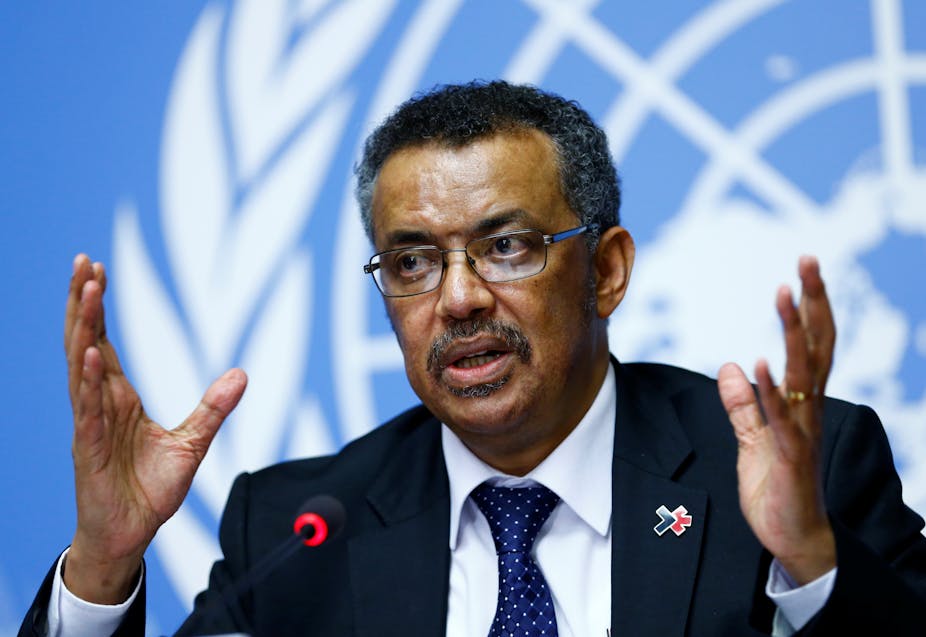Dr Tedros Ghebreyesus Adhanom is the first African to become the director-general of the World Health Organisation (WHO). He is also the first non-physician to head up the United Nations’ body.
He has big challenges ahead of him.
He will be expected use his formidable talents – including diplomacy – to boost the WHO’s image and finances, protect it against the whimsical policies of superpowers, and keep the organisation free of commercial influences.
Dr Tedros has already prioritised improving universal health coverage. As he put it:
All roads should lead to universal health coverage. I will not rest until we have met this.
To achieve this, he will need to strengthen health systems. But the challenge he faces is that the responsibility for strengthening health systems is different in different contexts, and it seldom falls directly to the WHO.
Such efforts are often driven by funders’ priorities. And for countries that don’t rely on external resources, such as China and India, investments in health systems tend to reflect domestic social sector policy and priorities.
It’s therefore worth asking: what can the WHO, or more specifically the DG, do to advance the health systems agenda? Here are three ideas that could be usefully pursued to achieve the outcome the DG desires.
Span boundaries
Much of global health activity is still organised into disease-specific silos. This can be insidious: it privileges narrow disease-specific solutions, when in reality more holistic systemic or political solutions may be in order.
The global response to the 2014 Ebola outbreaks provides a useful example to illustrate the problem. The outbreaks evoked fear of a global epidemic as thousands died in West Africa. As a result significant external resources were diverted to contain the epidemic, until it emerged that there were key missing links to the response – engaging local communities and strengthening local health systems.
The Ebola case highlighted the fact that there is never one silver bullet when addressing health issues, even in a crisis. Similarly, health gains depend heavily on action across a range of development sectors such as the environment, food, urban development and gender equality. To maximise gains coordination across all of them is vital.
An example of how this can work is well illustrated in Chhattisgarh, rural India where the demands of marginalised tribal communities for better health care were part of a larger movement for access to water and conservation of forest resources. Community health workers frequently engaged in supporting people’s needs beyond the health sector.
Breaking the silos and promoting boundary-spanning, across disease programmes and between development sectors, is key to making the health sector more effective. The Sustainable Development Goals offer ample opportunity to broker alliances with other global agencies, but also for the WHO to help mainstream intersectoral action as part of health systems strengthening efforts at national and local levels.
Diversify engagement with countries
As the first DG from a member state that is also a major recipient of global aid, Dr Tedros will be acutely aware of the boundaries between support to a country, and respect for its self-determination.
It will be interesting to see how the WHO will help developing countries balance the results orientation of donors, with institution-building initiatives that are necessary yet might not yield short-term gains.
The WHO is a member state organisation. But it can’t neglect the fact that states don’t necessarily represent the interests of all their people. Ultimately the WHO has a responsibility to promote democratic values and to help people’s voices be heard, especially those of the most vulnerable.
People all over the world are concerned about governance, including the governance of health systems. The desire to be freed of corruption and exploitation, to have basic rights and entitlements, and to be able to have a say in their own future are universal. These issues must be addressed by the WHO.
The emerging Health Systems Governance Collaborative at the WHO seeks to promote practical solutions and learning to improve governance at local and national levels. It is an interesting experiment that could extend WHO’s focus beyond the narrow domain of technical support, into complex real world health systems. But more such experiments are called for.
Make global health about care, not fear
A health system is, or should be, the institutionalisation of the basic human impulse to care. Its performance is a reflection of society’s will for caring. The WHO should manifest the global community’s collective commitment to caring – which translates practically into helping build caring institutions across the world.
The WHO can do more to support bottom-up practices: listening to voices of health system builders on the ground (particularly those engaged in caring for the poor), learning from and supporting them, and putting what they learn into practice and policy.
This change must be led by the DG as part of the organisational accountability reforms he has prioritised.
Global health is often described as a lexicon of threats, whether from antimicrobial resistance, climate change or epidemics. Safety and security are certainly critical elements of the health systems agenda. But if the rhetoric of fear overcomes that of care, the best-resourced health system will be ineffective in delivering good health equitably. The dream of universal health coverage will be elusive.
The WHO has a key role in ensuring that questions of global health security are never divorced from inclusivity.

